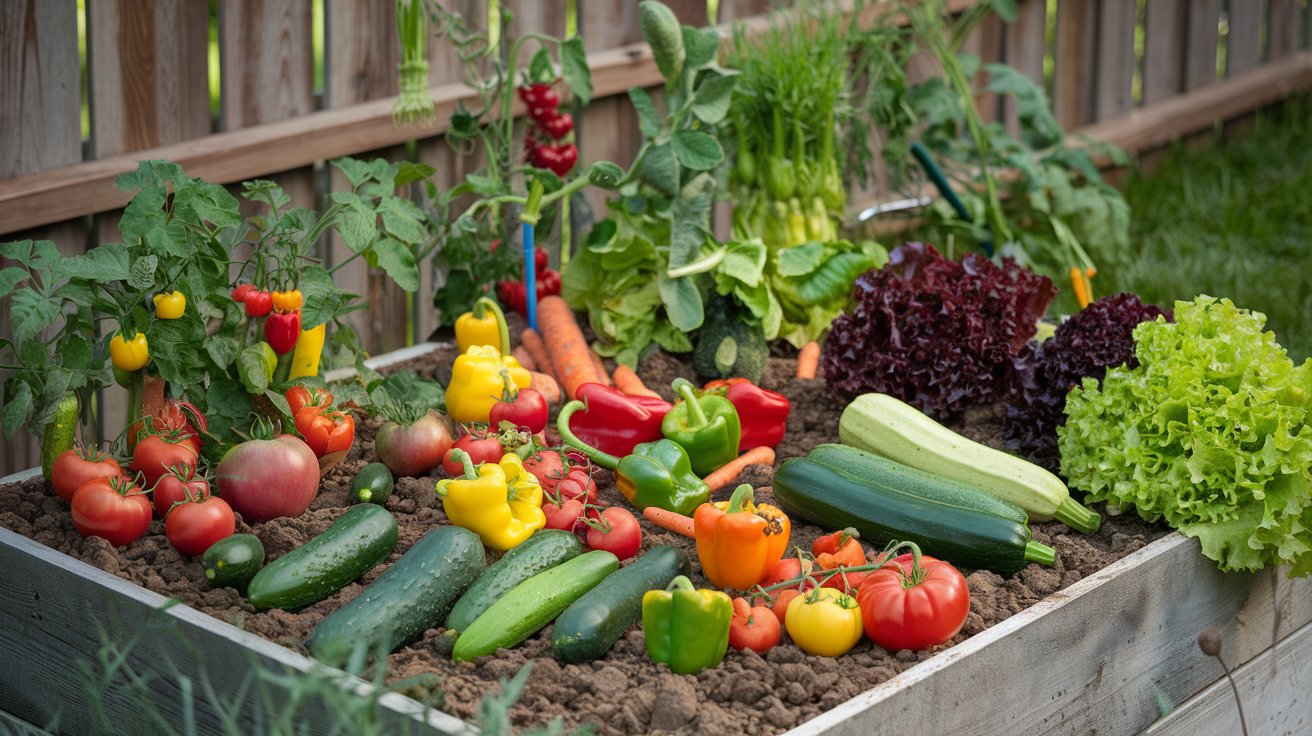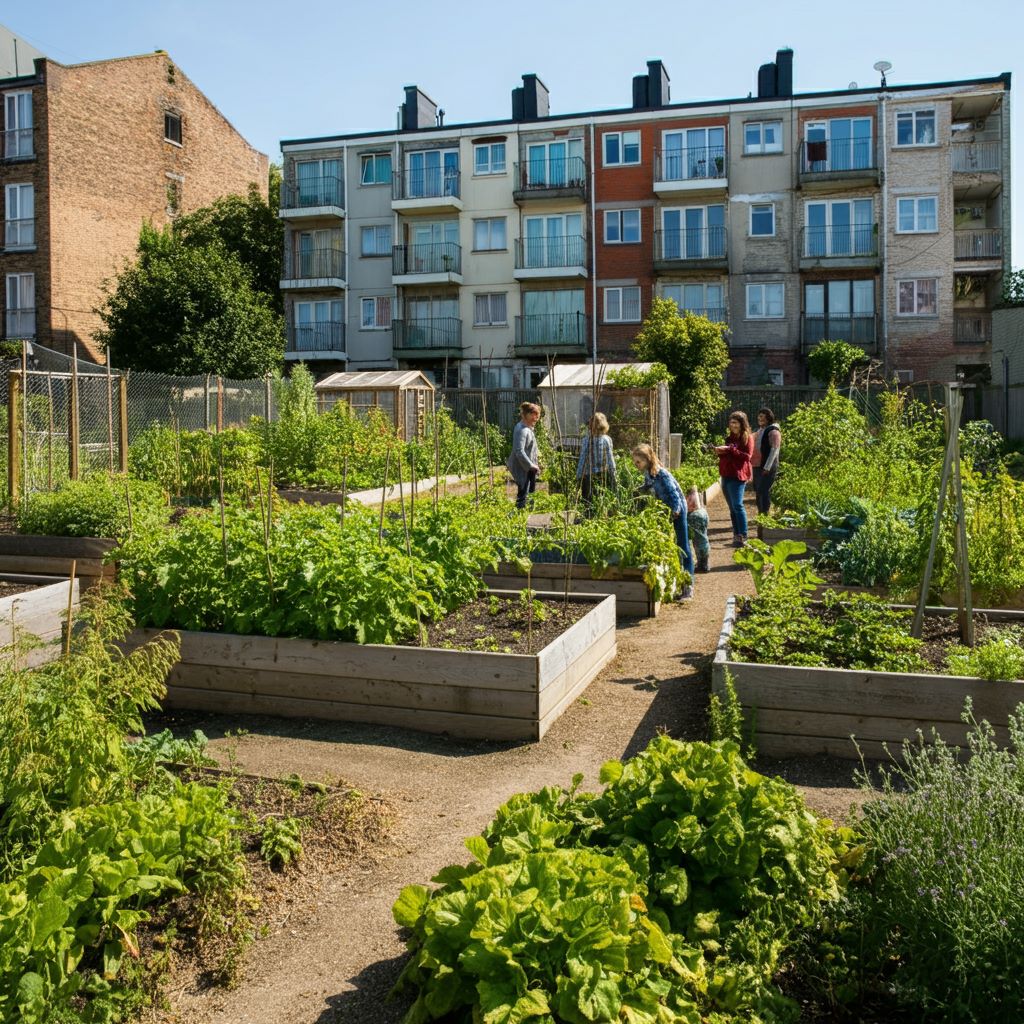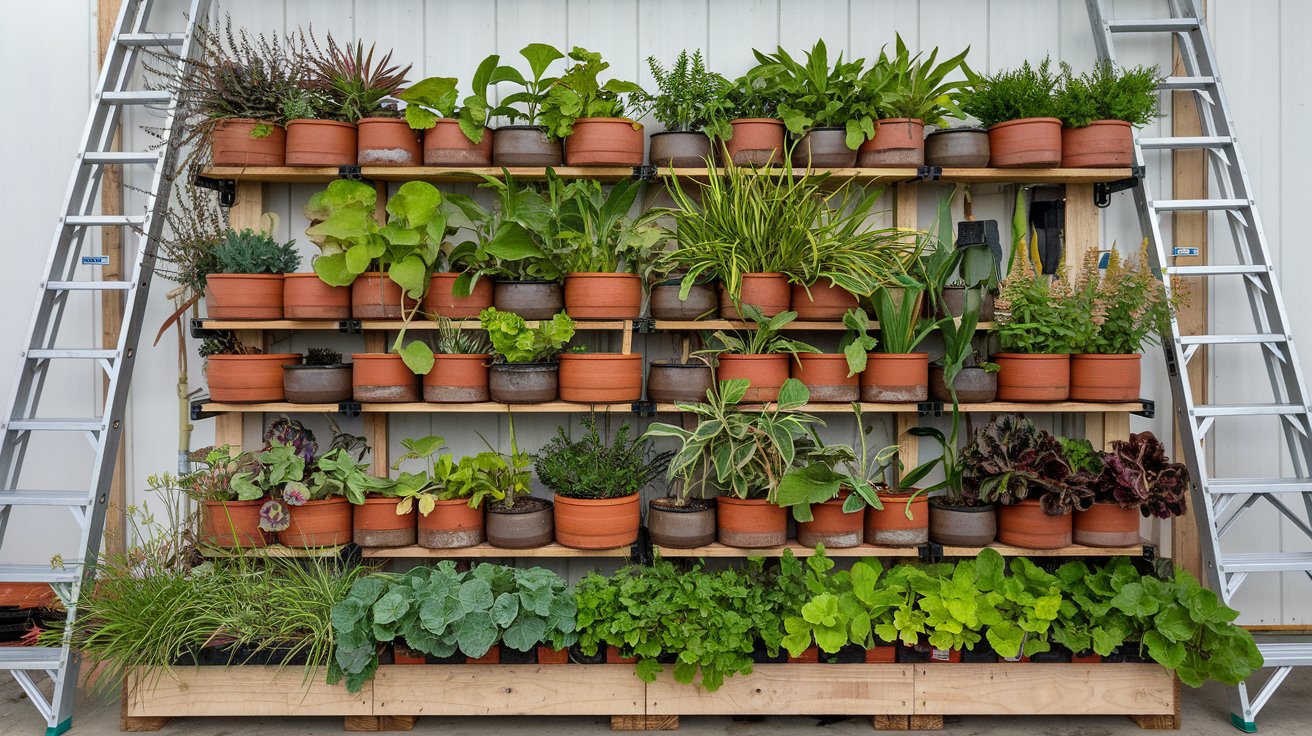Mulching is one of the most effective and simple strategies to ensure the health and success of your vegetable garden. The best mulch for vegetable garden use does more than just cover the soil — it nurtures plants by conserving moisture, controlling weeds, regulating temperature, and improving soil structure. Whether you’re growing tomatoes, carrots, or leafy greens, the right mulch can make a huge difference in the productivity and vitality of your garden.
In this guide, we will walk you through the 5 best mulches for vegetable gardens, explain how to apply them effectively, and help you make an informed decision based on your specific garden needs. By the end of this article, you will know exactly which mulch to choose to give your garden the best possible start.
Key Takeaways
- Mulch conserves soil moisture, reduces weed growth, and moderates temperature fluctuations.
- Organic mulches, such as straw, wood chips, and compost, enrich the soil over time.
- Different mulches are suited for various climates, vegetable types, and gardening styles.
- The proper mulching technique maximizes benefits like healthy plant growth, reduced maintenance, and increased crop yields.
Table of Contents
What is Mulch and Why is it Essential for Vegetable Gardens?
Mulch is a protective layer of material applied to the surface of the soil around plants. It helps to insulate the soil, conserve moisture, and keep weeds at bay, ultimately benefiting vegetable crops. Mulch can be made from both organic materials (like straw, leaves, and wood chips) and inorganic materials (like plastic or gravel). However, organic mulches are particularly beneficial because they break down over time, improving the soil’s health by adding valuable nutrients and enhancing microbial activity.
Benefits of Mulch for Vegetable Gardens:
- Moisture Retention: Mulch acts as a barrier that helps prevent the evaporation of water from the soil. This is especially important for vegetables, which often require consistent moisture.
- Temperature Regulation: During summer, mulch keeps the soil cool by shielding it from the harsh sun, while in the winter, it helps insulate plant roots from freezing temperatures.
- Weed Suppression: A thick mulch layer prevents sunlight from reaching weed seeds, making it harder for them to germinate and grow. This minimizes the need for chemical weed killers.
- Soil Enrichment: Organic mulches like compost and grass clippings break down over time, enriching the soil with nutrients and organic matter that promote healthy vegetable growth.
How Mulch Supports Healthy Vegetable Growth
In addition to its protective benefits, mulch also contributes to soil health. When organic mulch decomposes, it feeds the soil with essential nutrients, enhances soil structure, and fosters a thriving ecosystem of beneficial microorganisms. These organisms break down organic matter, release nutrients, and help aerate the soil. Furthermore, mulch helps prevent soil erosion and compaction by maintaining the soil structure, especially during heavy rainfall.
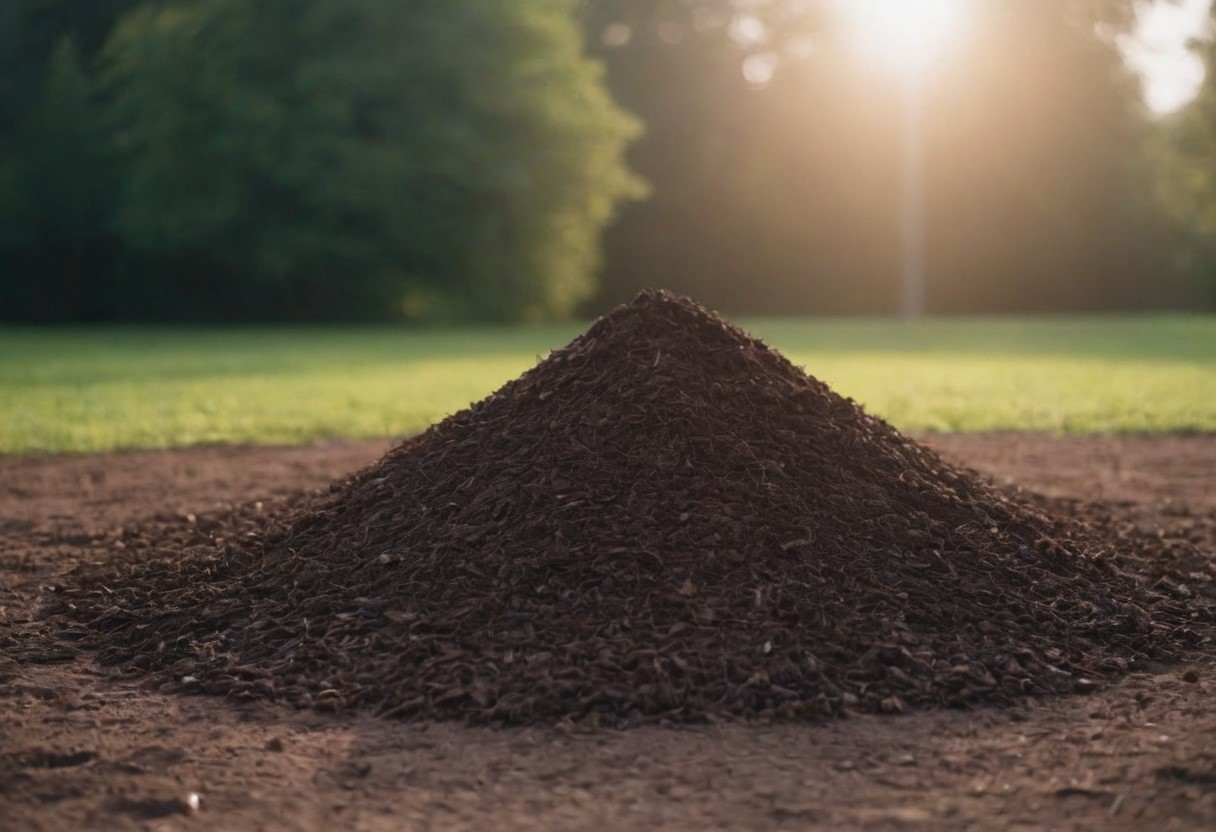
How to Choose the Best Mulch for Your Vegetable Garden
Selecting the best mulch for your vegetable garden involves understanding the specific needs of your plants and the local climate. There are several factors to consider when making your choice, such as moisture requirements, temperature regulation, and nutrient enrichment. Here’s a breakdown of what to consider:
Factors to Consider When Choosing Mulch
- Climate: Different types of mulch perform better in various climates. In dry and hot climates, mulches like straw or grass clippings that retain moisture are ideal. For cooler, wetter climates, mulches like wood chips or shredded leaves help maintain a healthy balance without becoming waterlogged.
- Vegetable Types: The type of vegetables you’re growing will determine the best mulch. Root vegetables like carrots and potatoes benefit from thicker mulch layers to insulate the soil. Leafy vegetables like spinach or lettuce require a lighter mulch layer to avoid suffocating them while still conserving moisture.
- Organic vs. Inorganic: Organic mulches break down over time and improve soil health, making them ideal for vegetable gardens. In contrast, inorganic mulches like plastic sheets and gravel provide long-lasting protection but don’t offer any soil improvement benefits.
Soil Requirements for Different Mulches
- Soil pH: Certain mulches can slightly alter the pH of your soil. For instance, wood chips may acidify the soil, while grass clippings add nitrogen, benefiting plants that thrive in slightly acidic or nitrogen-rich soils.
- Texture and Drainage: Mulch can help improve soil texture by loosening compacted soils and promoting better water retention. If your soil is heavy clay, organic mulches are particularly beneficial as they help break down the soil structure and improve drainage over time.
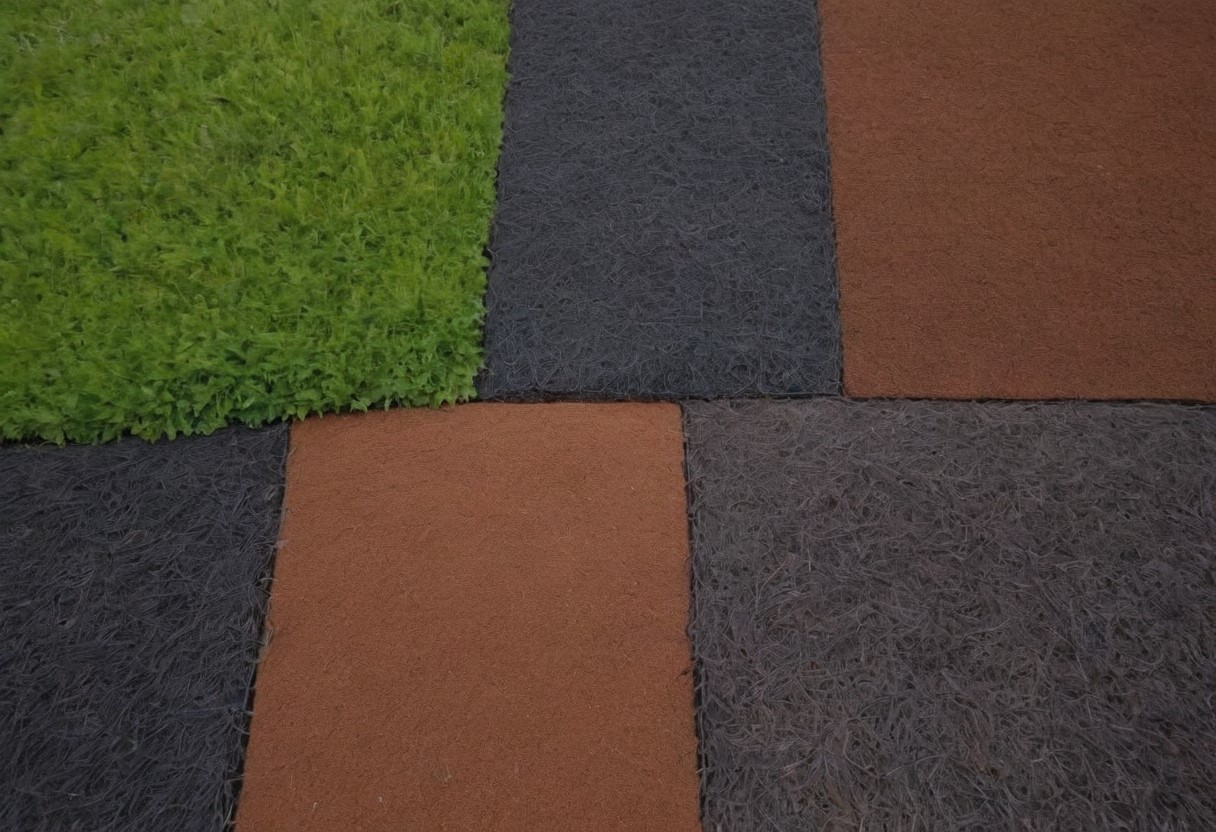
Best Mulches for Vegetable Gardens
When choosing the best mulch for vegetable gardens, it’s essential to select one that matches your specific needs. Here’s a rundown of the five most effective mulches for vegetable gardens, each offering unique benefits:
Straw or Hay Mulch
Straw and hay are one of the most popular mulch choices for vegetable gardens, especially for gardeners in temperate climates. Straw is easy to spread, light, and provides excellent moisture retention. It’s particularly effective for crops like tomatoes, cucumbers, and squash.
- Benefits:
- Great for moisture retention
- Helps control weed growth
- Decomposes into valuable organic matter
- Considerations:
- Can introduce weed seeds if not properly cured
- Needs to be replenished regularly
Wood Chips or Shredded Bark
Wood chips and shredded bark are perfect for vegetable gardens that require long-lasting mulch. While they break down slowly, they retain moisture and provide excellent insulation for the soil.
- Benefits:
- Long-lasting
- Good for larger garden beds and perennial crops
- Excellent at controlling weeds
- Considerations:
- Can attract pests if not carefully monitored
- Slow decomposition process
Grass Clippings
Grass clippings are an inexpensive and readily available mulch for your vegetable garden. They are rich in nitrogen, which helps fertilize the soil as they decompose. However, they should be used in thin layers to avoid matting, which can block water and air from reaching the soil.
- Benefits:
- Adds nitrogen to the soil
- Free and easy to obtain
- Works well for leafy vegetables like lettuce and spinach
- Considerations:
- Must be dried before use to prevent clumping
- Can cause a strong odor if not managed properly
Compost
Compost is an all-in-one mulch and fertilizer, making it perfect for vegetable gardens. It helps retain moisture, enriches the soil with nutrients, and improves soil structure as it breaks down.
- Benefits:
- Improves soil fertility and structure
- Rich in essential nutrients for plant growth
- Helps retain moisture and suppresses weeds
- Considerations:
- Needs to be replenished regularly
- Can be a bit more expensive than other mulches
Leaf Mold
Leaf mold is a naturally decomposed mix of fallen leaves. It’s excellent for adding organic matter to the soil, improving drainage, and enhancing overall soil health. Leaf mold can also be a more sustainable option, as it recycles yard waste.
- Benefits:
- Improves soil structure and drainage
- Slow-decomposing, so it lasts longer
- Ideal for vegetable beds that need additional organic matter
- Considerations:
- Takes time to prepare
- Not suitable for areas prone to heavy rains
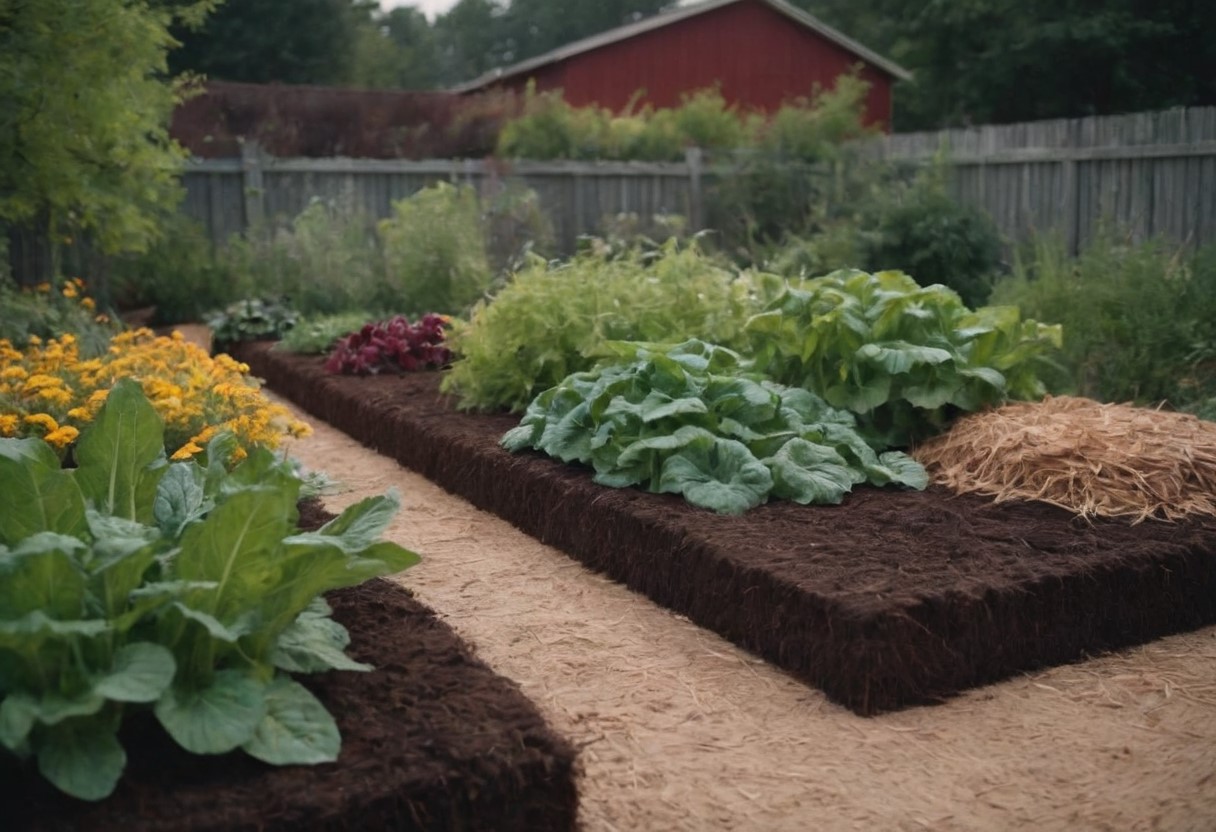
Best Mulch for Vegetable Garden: Organic vs. Inorganic Mulches
When deciding between organic and inorganic mulches for your vegetable garden, it’s essential to understand the advantages and limitations of each.
Organic Mulches
Organic mulches include materials like straw, leaves, compost, and wood chips. These mulches break down over time, enriching the soil with nutrients and improving soil structure.
- Pros:
- Adds organic matter to the soil
- Improves soil fertility and microbial activity
- Reduces the need for chemical fertilizers
- Cons:
- Needs regular replenishing
- Can attract pests if not maintained
Inorganic Mulches
Inorganic mulches, such as plastic, gravel, and landscape fabric, don’t decompose, making them long-lasting. They work well for weed control and moisture retention but don’t improve soil quality.
- Pros:
- Long-lasting and durable
- Good for preventing weeds and conserving moisture
- Requires little maintenance
- Cons:
- Does not improve soil health
- Can lead to water runoff or poor drainage if not applied correctly
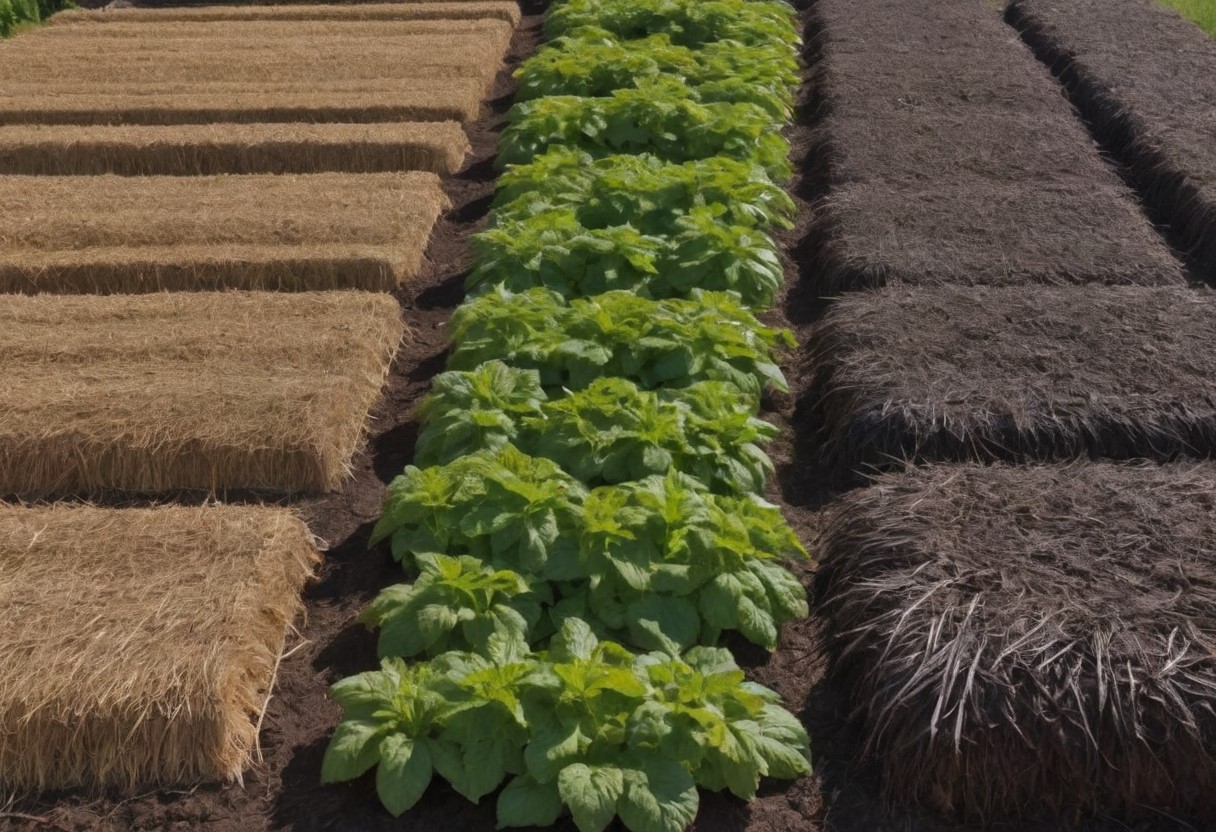
How to Apply Mulch Effectively in Your Vegetable Garden
Applying mulch the right way is crucial to getting the most out of it. Follow these simple steps to ensure your mulch benefits your vegetable garden throughout the growing season.
- Prepare the Soil: Before mulching, clear your garden bed of weeds, rocks, and debris. Loosen the soil to a depth of at least 2 inches to promote healthy root growth.
- Apply the Mulch: Spread the mulch evenly across the soil, making sure to leave a small gap around the stems of plants to prevent rotting. The ideal mulch depth is around 2-4 inches.
- Replenish Regularly: As organic mulches break down, they lose their effectiveness. Make sure to add more mulch as needed, especially during the growing season.
Conclusion: Choosing the Best Mulch for Vegetable Gardens
Choosing the right mulch for your vegetable garden will depend on your specific climate, the types of vegetables you grow, and your garden’s needs. Organic mulches like straw, compost, and wood chips are great for improving soil health, while inorganic mulches like plastic and gravel offer durability and weed control. By selecting the right mulch and applying it correctly, you’ll enhance your garden’s health, reduce maintenance, and enjoy a bountiful harvest.
Frequently Asked Questions
What is the best mulch for vegetable gardens in hot climates?
Mulches like straw, grass clippings, and wood chips are ideal for retaining moisture and protecting vegetable roots from heat.
Can I use fresh grass clippings as mulch in my vegetable garden?
It’s best to dry the grass clippings before use to avoid them matting together and creating a layer that doesn’t allow water to penetrate.
How often should I refresh the mulch in my vegetable garden?
You should add a new layer of mulch every season, or whenever it begins to decompose or break down significantly.
Is leaf mulch good for vegetable gardens?
Yes, leaf mold is an excellent mulch option for vegetable gardens, especially in the fall. It helps improve soil texture and adds organic matter.
What mulch is best for vegetable gardens with raised beds?
Organic mulches like straw, wood chips, or compost work best in raised beds as they retain moisture and nourish the soil.
Can I use plastic as mulch in my vegetable garden?
While plastic mulch prevents weeds and retains moisture, it doesn’t improve soil health. It’s better for high-maintenance crops like tomatoes.
Author’s Bio

Robert Martin is a passionate blogger and versatile content creator exploring the intersections of personal finance, technology, lifestyle, and culture. With a strong background in financial literacy and entrepreneurship, he helps readers make smarter money moves, build sustainable side hustles, and achieve financial independence.
Beyond finance, Robert shares his insights on home decor and gardening—offering practical ideas for creating beautiful, functional living spaces that inspire comfort and creativity. He also dives into the dynamic worlds of sports and celebrity news, blending entertainment with thoughtful commentary on trends that shape today’s pop culture.
From decoding the latest fintech innovations to spotlighting everyday success stories, Robert delivers content that’s informative, relatable, and actionable. His mission is to empower readers to live well-rounded, financially confident lives while staying inspired, informed, and ahead of the curve.


